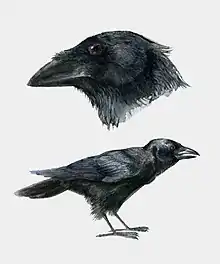Palm crow
The palm crow (Corvus palmarum) is a relatively small corvid that occurs mostly on the Caribbean island of Hispaniola (Haiti and the Dominican Republic). It was formerly quite frequent on Cuba, but has become severely reduced in number there.
| Palm crow | |
|---|---|
 | |
| Scientific classification | |
| Kingdom: | Animalia |
| Phylum: | Chordata |
| Class: | Aves |
| Order: | Passeriformes |
| Family: | Corvidae |
| Genus: | Corvus |
| Species: | C. palmarum |
| Binomial name | |
| Corvus palmarum Württemberg, 1835 | |
Taxonomy
The Cuban subspecies is slightly smaller, and is usually separated as a subspecies (Corvus palmarum minutus); the Hispaniolan subspecies' trinomial is Corvus palmarum palmarum (the nominate subspecies). Both subspecies are usually now given the respective common names of Hispaniolan palm crow and Cuban palm crow to distinguish them. Despite being sympatric with the white-necked crow (Corvus leucognaphalus) on Hispaniola, it appears to be more closely related to the fish crow (C. ossifragus) of the East Coast of the United States, as well as two smaller species, the Tamaulipas crow (C. imparatus) and Sinaloan crow (C. sinaloae) of Mexico, than the white-necked crow, which is more related to the Cuban crow (Corvus nasicus) and the Jamaican crow (Corvus jamaicensis), the other two Caribbean corvids.
Habitat
The local name for the palm crow is cao in the Dominican Republic (where it is locally common, mainly in mountain pine forests and also around the area of Lake Enriquillo), which is onomatopoeic of the simple and repetitive call of this bird.
References
- BirdLife International (2018). "Corvus palmarum". IUCN Red List of Threatened Species. 2018. Retrieved 17 December 2018.CS1 maint: ref=harv (link)

